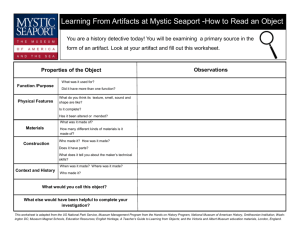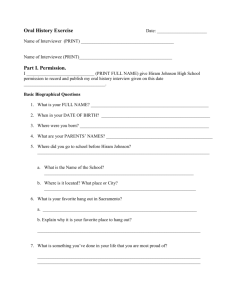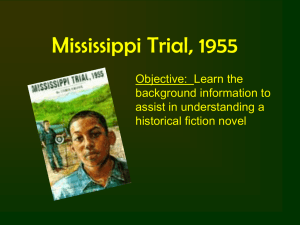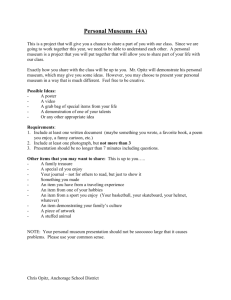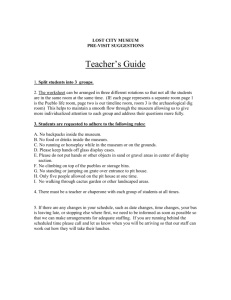Mississippi Trial, 1955: Museum Exhibit Presentation
advertisement
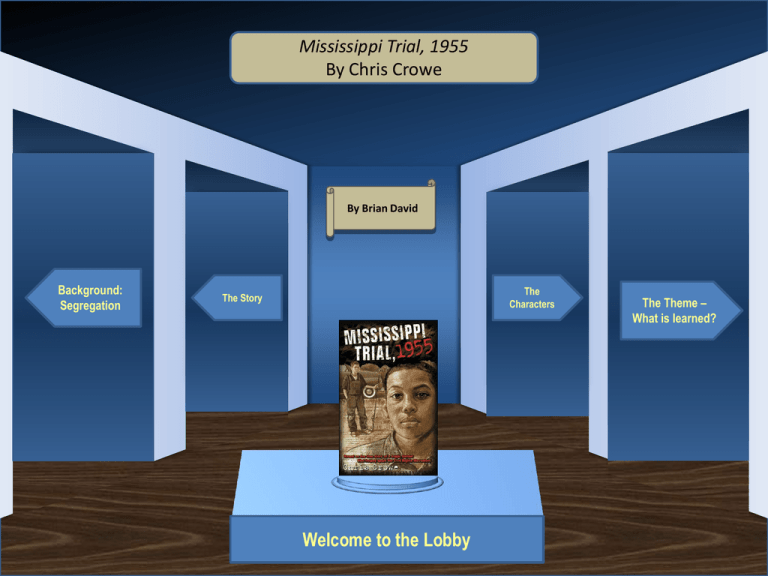
Mississippi Trial, 1955 By Chris Crowe By Brian David Background: Segregation The Characters The Story Museum Entrance Welcome to the Lobby The Theme – What is learned? Name of Museum Chris Crowe Chris Crowe is currently a professor at BYU and frequently…. Back to Lobby Name of Museum Background: Segregation Segregation “Separate but Equal” Brown v. Board of Education Name of Museum The story Beginning Middle End Name of Museum The characters Hiram Hillburn Earl Hillburn (Grandpa) R.C. Rydell Name of Museum Theme What does the protagonist learn? How do we know? (Quotes) What does the reader learn? Name of Museum Segregation Insert Artifact Picture Here Often referred to as “Jim Crow” laws, it was the Southern practice of legally separating the race. (Provide at least one direct quote from your sources) Back to Room 1 Name of Museum “Separate but Equal” Insert Artifact Picture Here This phrase comes from the Supreme Court case, “Plessy v. Ferguson”, and refers to the practice of… (Provide at least one direct quote from your sources) Back to Room 1 Name of Museum Brown v. Board of Education Insert Artifact Picture Here This was the landmark Supreme Court case, which overturned the results of… (Provide at least one direct quote from your sources) Back to Room 1 Name of Museum The Beginning Insert Artifact Picture Here Provide a brief summary of the events of this sections of the novel. Back to Room 2 Name of Museum The Middle Insert Artifact Picture Here Provide a brief summary of the events of this sections of the novel. Back to Room 2 Name of Museum The End Insert Artifact Picture Here Provide a brief summary of the events of this sections of the novel. Back to Room 2 Name of Museum Hiram Hillburn Stubborn – Hiram shows that, like the rest of his family he is stubborn: “…I’d had it with Dad’s sermons and weirdness about hate, racism, equal rights and all that…I let him know in a thousand ways that I’d just as soon live in the Arizona desert with Gila monsters and tarantulas than spend any time with him.” (Crowe 2) – Hiram refuses to even listen to, or try to understand, what his father is saying. His stubborn nature makes it hard for him to see things from someone else’s point of view. Conflicted – For most of the novel, Hiram spends his time questioning what he once thought was right: “…a whole lot of tossing and turning came from my wondering if maybe Dad wasn’t so crazy after all.” (Crowe 97) – After witnessing R.C.’s attack on Emmett, and hearing his Grandfather’s response, Hiram begins to questions what he was always taught about the Southern way of life be superior. Back to Room 3 Name of Museum Earl Hillburn (Grandpa) Provide two character traits and a quote to support each one. Be sure to cite the quote and explain why it demonstrates that trait. Back to Room 3 Name of Museum R.C. Rydell Provide two character traits and a quote to support each one. Be sure to cite the quote and explain why it demonstrates that trait. Back to Room 3 Name of Museum What does the protagonist learn? Hiram learns how racisms and hatred can lead to violence. His first example of this is when R.C. viciously attack Emmett Till, simply because he call Hiram his “friend”. R.C. responds violently by knocking Emmett to the ground, threatening both boys with a knife, and shove fish gut in Emmett’s mouth in order to remind him that white and black are not supposed to be friends in the South. Hiram is also shocked at how angry people are about Emmett Till’s murder, but not at Bryant and Milam. They are angry at the north for ‘stirring up trouble’ and at Emmett for not knowing his place. For the first time in his life Hiram realizes why his father is so against his Grandfather’s hateful thinking. Back to Room 4 Name of Museum What does the reader learn? The reader receives a firsthand look at the way a society caught up in racism and racial tension. The reader sees through the violence of R.C., Grandpa’s hatred, and the vicious torture and murder of Emmett Till, how violent hate can be. By seeing the story from Hiram’s perspective the reader learns how being blinded by racial mistrust and hate, can lead even decent people to do or condone unspeakable actions. Back to Room 4 Name of Museum How do we know? (Quotes) “White folk don’t share nothin’ with colored, boy. Nothin’,” (Crowe 91). R.C.’s reaction at such a simple request, and the hatred that cause Bryant and Milam to torture and murder 14-year-old Emmett, Make Hiram realize how bad things really are in the South. “These two men – and others – had murdered a boy, and now their fellow citizens had not only turned them loose but were celebrating,” (Crowe 192). Hiram is shocked by how all these normal people could treat men accused of the torture and murder of a child, as heroes. “..I’m damn sorry for what happened for what happened, but that boy brought trouble on himself,” (Crowe 96). Hiram’s grandfather continually repeats this idea that Emmett made his own trouble, both with R.C.’s attack and with the murder. Hiram is shocked that the general attitude of the South toward what happened to Emmett. Back to Room 4
